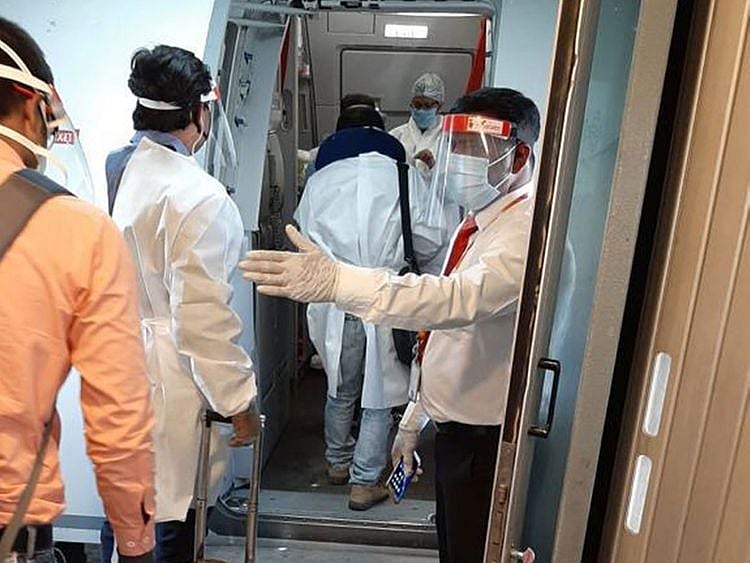Fewer flights, more protection in phase 3 of Indian repatriation from UAE
25 flights until June 23, six per cent of registered Indians flew home in past month

Dubai: Fewer number of flights and more protection from coronavirus await stranded Indians in the third phase of the COVID-19 repatriation from the UAE.
The revised schedule announced on Saturday by Air India (AI) and Air India Express (AIE) shows that only 25 flights under the Vande Bharat Mission (VBM) will repatriate stranded Indians from the UAE in the third phase of the mission, from June 9 to 23.
This includes the first-ever repatriation flight to the state of Maharashtra, which is an Abu Dhabi-Mumbai flight on June 11.
Fourteen flights will depart from Abu Dhabi while the rest will be from Dubai.
While the number of flights has come down compared to the second phase, which is ending on Monday, June 8, with a Dubai-Chennai flight, the airlines told Gulf News on Sunday that they will abide by the new guidelines to ensure more protection to passengers.
In line with the directives of the Supreme Court of India and the Director General of Civil Aviation (DGCA), the airlines would provide face shields to all passengers on repatriation flights while those occupying the middle seats would be given protective wrap-around gowns, officials confirmed.
“We have already started distributing them to passengers,” P.G. Prageesh, chief of Corporate Communications, AIE, said over phone from India.
He said the additional protective gear is being offered as the airlines are not leaving the middle seats empty due to the passenger load.
Rasheed Thayyil, managing director of Al Arabia Uniforms in Ajman, who has supplied and donated such protective gear to many of the already repatriated Indians, said those passengers were found to be more protected than those who used only masks and gloves.
“Many people including my mother and people, who used the gowns, face shield and clip caps for head, did not catch the virus while some of their co-passengers who used only masks and gloves as protective gears did test positive for COVID-19 later.”
He suggested that all passengers should be given this additional protective gear, not just those sitting in the middle seats.
More seats, less fare
The option to allow passengers use the middle seats with extra protective gear will also help prevent hikes in ticket fares, Consul General of India in Dubai, Vipul told Gulf News.
“As long as the middle seat is allowed to be filled, we don’t lose out on seats and a big jump in the fare,” he explained.
When asked about the fewer number of flights allotted in the next phase, Vipul claimed that the total number of Indians getting repatriated is not likely to go down since many charter flights are being approved for the third phase.
He revealed that 14,140 passengers, including 300 infants, were repatriated on 79 flights from Dubai since the beginning of the Vande Bharat Mission on May 7.
“We have also repatriated mortal remains of 52 persons,” he said.
According to the figures available from the Indian Embassy in Abu Dhabi, around 6,100 Indians were flown home on 11 flights from the emirate in one month.
The Embassy said a total of 2,681 workers were also repatriated by their employers on 15 charter flights.
Vipul said the consulate had also approved two other charter flights by corporates which flew home 360 employees and their family members.
Registration crosses 400,000
Altogether, only about 6 per cent of the 400,000 (about 12 per cent of the total number of Indians in the UAE) who have registered with the missions for repatriation have been repatriated in the past one month.
When asked why the government has not included more flights as had been promised earlier, Vipul attributed it to the distribution of flights to less served sectors in other countries and the approval given to more charter flights from the UAE.
“We are hoping that we will have several charter flights operating in the next phase,” he said.
Kerala becomes lenient on charters
Most of the charter flights being arranged by community groups are to the state of Kerala, which had recently stipulated that those flights cannot charge more than the fares on the special repatriation flights operated by the government.
Organisations that applied for chartering flights had slammed the decision citing no airline would operate charter flights for such low cost.
However, the issue is now likely to be resolved with the Kerala government becoming more lenient regarding pricing of tickets on charter flights and giving initial approval to dozens of charter requests to the Gulf countries.
“The government of Kerala later prescribed that fares should be ‘comparable’ to the flights under the Vande Bharat Mission and they should give priority to the most deserving passengers like pregnant women, those with medical emergencies and people who lost jobs,” said Vipul.
“I hope that all community organisations will abide by this so that many needy people are benefitted and more people can fly home.”
However, there was no clarity on any benchmark for comparing the fares to ensure charter flights are not exploiting the helplessness of the desperate passengers.
Sign up for the Daily Briefing
Get the latest news and updates straight to your inbox
Network Links
GN StoreDownload our app
© Al Nisr Publishing LLC 2025. All rights reserved.